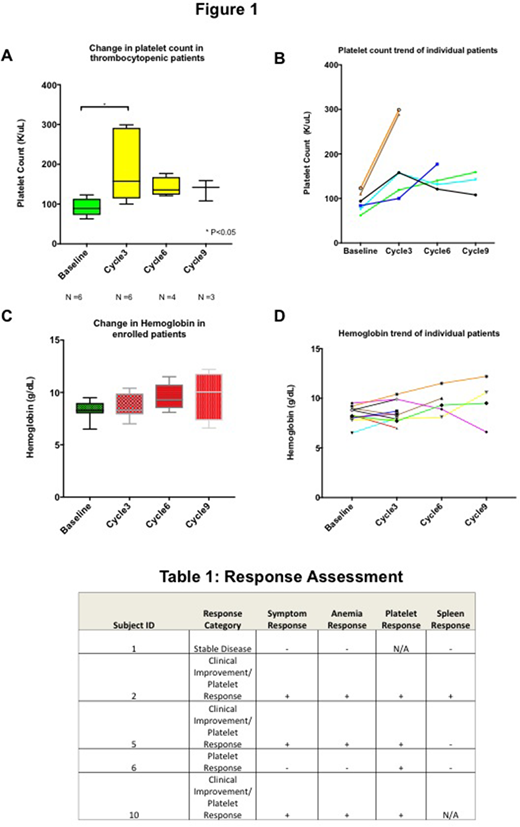Abstract
Background: Among the most frequent and challenging hematologic manifestations of myelofibrosis (MF) are anemia and thrombocytopenia, the presence of which portends an adverse outcome. Few effective modalities to address these cytopenias exist, particularly thrombocytopenia. Further, although the FDA-approved JAK1/2 inhibitor Ruxolitinib (RUX) has demonstrated significant clinical efficacy in MF patients, RUX frequently results in anemia and thrombocytopenia. Thrombocytopenia in particular often results in dose attenuation of RUX. Thalidomide (THAL) is a first-in-class immunomodulatory agent. Studies of THAL in MF patients, alone and with prednisone, have demonstrated improvements in anemia and thrombocytopenia. We therefore sought to examine whether combination of RUX and THAL could result in improvement in both disease-related and therapy-related cytopenias, as well as improve overall disease response in patients with MF. Here we report initial analysis of this study (NCT03069326).
Methods: We conducted a multicenter two stage phase II trial designed to assess the effect of RUX and THAL combination in subjects with primary, post-polycythemia vera, or post-essential thrombocythemia myelofibrosis. Patients taking RUX at the time of enrollment must have had less than PR per IWG-MRT/ELN 2013 criteria, or be refractory, to RUX single-agent therapy. Patients must have been taking RUX for a minimum of 3 months, and must have been on a stable dose of RUX for a minimum of 4 weeks immediately prior to enrollment. Treatment-naïve patients received single-agent RUX for 3 months (run-in phase) per label, and went on to combination therapy if they achieved less then a PR per IWG-MRT/ELN criteria. Each cycle of therapy was 28 days. Response assessment was evaluated according to the IWG-MRT/ELN 2013 criteria. Platelet response criteria in patients with baseline thrombocytopenia (less than lower limit of normal) included: Major response (≥75% increase in platelet count), Intermediate Response (≥50% increase) and Minor Response (≥25% increase). Adverse events were assessed using the NCI CTCAE v. 4.0. The primary endpoint was the proportion of treated subjects that achieved a response by IWG-MRT criteria and by platelet response criteria.
Results: A total of 25 patients are planned to be accrued. At the time of this writing, a total of 18 patients have been accrued. The median age was 70.5 years (47-85). 8 patients had received prior therapies other than RUX, including imetelstat, momelotinib, danazol, pomalidomide, darbepoetin alpha and sotatercept. 7 patients enrolled to the run-in phase. 14 patients received red blood cell transfusions prior to study enrollment. Evaluation of platelet count in patients with baseline thrombocytopenia demonstrated a significant increase in platelet count at cycle 3 of therapy compared to baseline (Figure 1A and B; P<0.05). An increase in Hgb was observed over successive cycles of combination therapy (Figure 1C and D). 5 of 18 accrued patients completed ≥6 cycles of combined therapy at the time of abstract submission and were thus evaluable for response assessment. The overall response rate in these patients was 80% (4/5 patients). Clinical Improvement (Anemia response and Symptom response) occurred in 3 patients (both responses observed in all 3 patients). Major platelet response was observed in 4 of 5 patients with baseline thrombocytopenia. 1 patient met criteria for spleen response (Table 1). Grade 3/4 non-hematologic adverse events regardless of attribution included; limb edema, diverticulitis, hypertension, syncope. 1 patient experienced a thromboembolic event. 1 patient experienced a grade 3 hematologic AE (neutropenia).
Conclusions: The combination of THAL and RUX has demonstrated a promising efficacy signal in this initial analysis of an ongoing phase II study, and appears to be well tolerated. Platelet count increases were observed in all patients who entered study with baseline thrombocytopenia, a response which appears to be maintained in the majority of patients observed 6 months after starting combination therapy. As well, anemia responses were observed in 3 of 5 evaluable patients. Collectively, these data indicate a potential role for this regimen in patients with anemia and/or thrombocytopenia, who otherwise have limited treatment options. Updated data on duration of response and overall response of all accrued patients will be presented.
Rampal:Constellation: Research Funding; Celgene: Honoraria; Incyte: Honoraria, Research Funding; Jazz: Consultancy, Honoraria; Stemline: Research Funding. Verstovsek:Italfarmaco: Membership on an entity's Board of Directors or advisory committees; Celgene: Membership on an entity's Board of Directors or advisory committees; Incyte: Consultancy; Novartis: Membership on an entity's Board of Directors or advisory committees, Research Funding, Speakers Bureau. Stein:Celgene: Consultancy; Bayer: Consultancy; Agios: Consultancy; Daiichi Sankyo: Consultancy; Novartis: Consultancy; Pfizer: Consultancy. Kadia:Pfizer: Consultancy, Research Funding; Pfizer: Consultancy, Research Funding; Novartis: Consultancy; Amgen: Consultancy, Research Funding; Takeda: Consultancy; Takeda: Consultancy; Celgene: Research Funding; BMS: Research Funding; Novartis: Consultancy; Abbvie: Consultancy; Amgen: Consultancy, Research Funding; Celgene: Research Funding; BMS: Research Funding; Jazz: Consultancy, Research Funding; Abbvie: Consultancy; Jazz: Consultancy, Research Funding. Mauro:Bristol-Myers Squibb: Consultancy; Novartis: Consultancy, Research Funding; Pfizer: Consultancy; Takeda: Consultancy. Pemmaraju:SagerStrong Foundation: Research Funding; daiichi sankyo: Research Funding; novartis: Research Funding; abbvie: Research Funding; cellectis: Research Funding; samus: Research Funding; Affymetrix: Research Funding; stemline: Consultancy, Honoraria, Research Funding; celgene: Consultancy, Honoraria; plexxikon: Research Funding. Bose:Blueprint Medicines Corporation: Research Funding; Astellas Pharmaceuticals: Research Funding; Incyte Corporation: Honoraria, Research Funding; Constellation Pharmaceuticals: Research Funding; Celgene Corporation: Honoraria, Research Funding; Pfizer, Inc.: Research Funding; CTI BioPharma: Research Funding.
Author notes
Asterisk with author names denotes non-ASH members.


